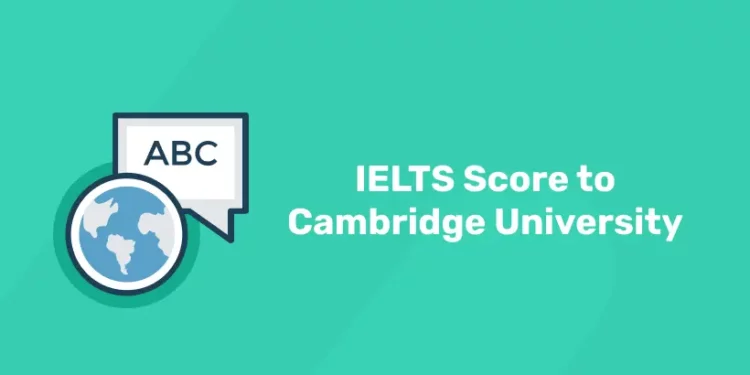Table of Contents
Cambridge University, one of the world’s leading academic institutions, attracts the students from all over the globe. For the non-native English speakers, proving the proficiency in English is an important part of the application process. One of the most recognized and accepted ways to reveal this proficiency is through the IELTS (International English Language Testing System). In this post, we’ll cover the minimum IELTS Score to the Cambridge University, why they are important, and how you can prepare to meet their standards.
Master the IELTS Exam with Online Coaching – Enroll Today!
Introduction
Meeting the IELTS score requirements for Cambridge University is an important step in the application process for non-native English speakers. With an overall score of 7.0 or 7.5 depending on the course, along with thestrong section scores, Cambridge ensures that all the students were prepared for the academic challenges ahead. By focusing on the academic English, the practicing time management, and using the official preparation materials, you can improve your chances of achieving the scores you need to secure your place at one of the world’s most prestigious universities.
About British Cambridge University
One of the oldest and most renowned universities in the world is the University of Cambridge, which was established in 1209. Situated in the picturesque city of Cambridge, England, it boasts an illustrious history of academic distinction and inventive research. Cambridge is well known for its top-notch academic offerings in a wide range of fields, such as the arts, sciences, engineering, law, and medicine.
The unique educational experience offered by Cambridge University, which includes more than 31 autonomous colleges, is achieved through targeted instruction through lectures and tutorials that foster students’ ability to think critically and independently. The numerous world leaders and trailblazing scientists who have passed through Cambridge’s halls attest to the university’s lengthy history as a global leader in research and education. Because of its cutting-edge research facilities and strong worldwide presence, the university is a popular choice for scholars and students worldwide.
Master the IELTS Exam with Online Coaching – Enroll Today!
Why IELTS is Important for Admission to Cambridge University
A widely accepted English proficiency exam that willassesses the candidate’s understanding, communication, and application of the language in a classroom context is the International English Language Testing System, or IELTS. A vital stage in the admissions process for the non-native English speakers who want to attend the Cambridge University is achieving the minimum IELTS score. The following explains in great detail why the Cambridge University admissions depends on the IELTS score:
1. Cambridge’s High Academic Standards
Cambridge University is known for its excellent academic environment, and the students are expected to engage with the complex texts and produce well-researched academic papers. As the primary language of the instruction at Cambridge is English, it is the essential that all the students possess a high level of proficiency in English to thrive in this environment.
The IELTS exam serves as a standardized measure to assess whether the applicants, especially the international students, have the necessary language skills to meet these academic demands. By ensuring that the candidates meet the specific IELTS score requirements. Also the Cambridge can maintain its high educational standards and support the academic excellence.
2. Ensures the Effective Communication and Participation
One of the key aspects of studying at Cambridge is active the participation in the lectures, seminars, and the tutorials. These sessions require the students to not only unerstand the complex academic materials but also engage in the discussions, debates, and presentations.
Without the strong English language skills, students may struggle to fully participate in the academic and the social life at Cambridge, which can hold up their overall learning experience.
3. Supports Success in Research and Writing
Cambridge University is renowned for its emphasis on the independent research and writing. Whether at the undergraduate or postgraduate level, the students are often required to conduct research, analyze data, and present their findings through essays, reports, or the papers.
The IELTS test assesses a student’s ability to:
- Cambridge students often engage with the journal articles, research papers, and the technical reports, which require a strong command of the academic English.
- Academic writing at the Cambridge demands precision, structure, and the critical analysis. The IELTS writing component tests a student’s ability to produce well-organized, clear arguments and skills that are important for the success at the university.
- The Lectures, presentations, and the group discussions at Cambridge involve the exchange of high-level ideas. The IELTS listening scores help to ensure that the students can follow and contribute meaningfully to these conversations.
4. Ensures the Smooth Integration into Campus Life
Cambridge is home to a diverse community of students from all over the world. Proficiency in English not only facilitates the academic success but also ensures that the students can integrate smoothly into university life. A good IELTS score enables the students to communicate effectively with peers, form social connections, and participate in the extracurricular activities.
Cambridge is a vibrant city with a rich cultural scene. Proficiency in English allows the students to enjoy the full breadth of experiences—both the academic and social—that Cambridge has to offer. Being able to communicate comfortably in English helps students form bonds with their peers, contribute to the group projects, and engage with university staff, fostering a more enriching and the supportive experience.
5. A Standardized Measure of Language Proficiency
The Cambridge University attracts applicants from diverse linguistic backgrounds. IELTS provides a standardized measure to assess all the applicants fairly, regardless of where they come from or their educational background.
By setting the specific IELTS score requirements, Cambridge ensures:
- Every applicant is evaluated on the same scale, ensuring that all non-native English speakers meet a consistent level of the proficiency.
- An IELTS score acts as a reliable predictor of a student’s ability to succeed in an English-speaking academic environment. The test covers all the four language skills (listening, reading, writing, and speaking), which are integral to the academic success at Cambridge.
6. IELTS as a Requirement for Visa and Immigration Purposes
For the international students applying to study at Cambridge, the IELTS score is not just important for the university admissions but also for the visa and immigration purposes. The UK government requires proof of English proficiency as part of the student visa application process, and the IELTS is widely accepted for this purpose.
Achieving the required IELTS score is essential for obtaining a UK student visa. This score show that the student is capable of studying and living in an English-speaking environment. By securing the necessary IELTS score, international students ensure that they meet both the university’s and the UK government’s requirements for the admission and the residence.
7. Preparation for a Global Career
Many Cambridge graduates go on to pursue the international careers in various industries, including the academics, business, law, and the technology. A strong command of English is important for navigating the global workforce. IELTS not only prepares students for the academic challenges of Cambridge but also equips them with the language skills needed for the professional success.
Minimum IELTS Score Requirement for Cambridge University
In order to make sure that students are capable of handling the demanding academic program, Cambridge University has strict requirements for English language proficiency. The International English Language Testing System, or IELTS, is one of the most well recognized tests for evaluating English competence, which is a requirement for non-native speakers of the language throughout the admissions process.
The IELTS score criteria for Cambridge vary based on the course or program you are applying to. These are the following:
1. Standard Level Requirement
- The Overall IELTS Score: 7.0
- The Minimum Section Scores:
- Listening: 6.5
- Reading: 6.5
- Writing: 6.5
- Speaking: 6.5
This score level is required for many undergraduate and postgraduate programs that do not have particularly demanding the language requirements. Courses in fields such as engineering, mathematics, and the natural sciences often fall into this category. However, even for these programs, the students are expected to have a strong grasp of academic English to perform well in their studies.
2. Higher Level Requirement
- The Overall IELTS Score: 7.5
- Minimum Section Scores:
- Listening: 7.0
- Reading: 7.0
- Writing: 7.0
- Speaking: 7.0
The higher level IELTS requirement applies to the courses with more intensive language demands, such as those in the humanities, social sciences, law, and literature. These programs require students to engage with the complex texts, participate in the discussions, and produce high-level written work, which demands a superior command of the English language.
IELTS Score Validity and Application Process
English language competency is a must if you’re applying to Cambridge University as an international student, especially if you’re from a non-native English-speaking nation. The International English Language Testing System is one of the most widely used and acknowledged methods to demonstrate this (IELTS). This is a thorough examination of the Cambridge University application procedure and the validity of IELTS scores.
1. IELTS Score Validity for Cambridge University
Your IELTS score is not valid indefinitely. Like the most universities, Cambridge has a specific period during which your test results are considered valid.
- The IELTS score is valid for two years from the date of the exam. This means that your score must be less than two years old when you submit your application. If your score has expired before you apply, you’ll need to retake the IELTS exam to meet the university’s requirements.
Why is the Validity Limited?
Language proficiency can change over time, especially if you’re not actively using or improving your skills. Cambridge University wants to ensure that all students possess a current and accurate level of English proficiency when they begin their studies.
2. IELTS Score Submission Process for Cambridge University
If you’re required to provide an IELTS score as part of your application, follow these steps:
Step1: Register for the IELTS Test
- You can register for the IELTS test online through official testing centers worldwide. Ensure that you choose IELTS Academic, as Cambridge University requires the academic version of the test.
Step2: Take the Test
- The test consists of four sections: Listening, Reading, Writing, and Speaking. Each section will assess a different aspect of your English skills. You’ll receive an overall band score, as well as individual scores for each section.
Step3: Meet Cambridge’s Minimum Score Requirements
- Ensure that your IELTS scores meet Cambridge’s minimum requirements, which typically fall under either the Standard Level (7.0 overall with 6.5 in each section) or Higher Level (7.5 overall with 7.0 in each section) depending on your program.
Step4: Submit Your Scores
- Cambridge University requires that your official IELTS test results be sent directly from the IELTS testing center to the university. You can request this during your test registration or after receiving your test results.
- You will be provided with a Test Report Form (TRF), which contains your IELTS scores. Ensure that your scores are sent to Cambridge as part of your application. Most testing centers offer an option to send the results electronically to universities.
3. Application Process for Cambridge University
When applying to Cambridge, your IELTS score is just one part of a comprehensive application process. Here’s an outline of how to submit a successful application:
Step1: Choose a Course
- Decide on the course you want to study and check the specific IELTS requirements for that program. Each course may have slightly different score requirements depending on the language demands of the subject.
Step2: Prepare Your Application Materials
- In addition to your IELTS score, you’ll need to provide:
- Academic transcripts and qualifications
- Letters of recommendation
- Personal statement or statement of purpose
- Resume (for postgraduate applications)
- Any required admissions tests (such as the SAT, BMAT, etc.)
Step3: Submit Your Application
- Most applications for undergraduate studies are submitted through the UCAS (Universities and Colleges Admissions Service) portal, while postgraduate applications are typically submitted directly to the university via its online application portal.
Step4: Send Your IELTS Scores
- Make sure that your IELTS test scores are sent directly to Cambridge University. You can specify this during the test registration process by selecting Cambridge as one of the institutions that will receive your scores.
Step5: Await Feedback
- After submitting your application and IELTS scores, Cambridge will review your complete application. If selected, you may be invited for an interview. If successful, your offer may be conditional on achieving the required IELTS scores (if you haven’t submitted them yet) or other academic requirements.
Master the IELTS Exam with Online Coaching – Enroll Today!
IELTS Preparation Tips for Cambridge University Applicants
1: Most university students ........................ on campus in their first year.
Preparing for the IELTS test can significantly impact your ability to meet Oxford University’s high language proficiency standards. Here are some targeted tips to help you excel:
1. Understand the Test Format
Familiarize Yourself with Each Section:
- Listening: 4 sections, 40 questions. You’ll listen to recordings and answer questions.
- Reading: 3 sections, 40 questions. Comprehend and analyze various texts.
- Writing: 2 tasks. Write an essay and a report or letter.
- Speaking: 3 parts. Engage in a personal interview, discussion, and a task-based conversation.
Practice with Sample Tests:
- Use official IELTS practice materials and sample tests to understand the format and types of questions.
2. Focus on Academic English
- Reading: Read academic articles, journals, and essays to improve comprehension and vocabulary.
- Writing: Practice writing essays and reports on academic topics. Focus on structure, argumentation, and formal language.
- Listening: Listen to academic lectures, podcasts, and debates to get accustomed to different accents and technical language.
- Speaking: Engage in discussions on academic subjects, practice explaining complex ideas clearly.
3. Improve Time Management
- Simulate test conditions by timing yourself during practice sessions. This helps build the stamina and speed needed for the actual test.
- Develop strategies to allocate your time effectively for each section. Avoid spending too much time on any single question.
4. Enhance All Four Language Skills
Listening:
- Practice with a variety of English accents. Use IELTS practice tests and resources like TED Talks and news broadcasts.
Reading:
- Read widely, including newspapers, scientific articles, and literature. Practice skimming for information and scanning for details.
Writing:
- Write essays and reports on different topics. Seek feedback from teachers or online writing communities to improve.
Speaking:
- Engage in regular conversations in English. Practice speaking clearly and confidently, and work on your pronunciation and fluency.
5. Use Official Preparation Resources
- Utilize official IELTS preparation books and online resources. These materials reflect the actual test format and provide valuable practice.
- Consider enrolling in an IELTS preparation course if you need structured guidance and professional feedback.
6. Take Care of Your Well-being
- Ensure you are well-rested before the test. A clear and alert mind performs better.
- Maintain a balanced diet and exercise regularly. Good physical health contributes to mental sharpness and focus.
7. Take Practice Tests
- Take full-length practice tests under timed conditions to gauge your readiness and identify areas for improvement.
- After each practice test, review your answers to understand your mistakes and work on them.
8. Seek Professional Guidance
- Consider working with an IELTS tutor or attending workshops to receive personalized advice and strategies.
- Participate in language exchange programs or conversation clubs to practice speaking and listening in informal settings.
9. Focus on Test Day Preparation
- Familiarize yourself with the test center location and procedures. Arrive early to avoid any last-minute stress.
- Ensure you bring valid identification and any other required documents.
- Use relaxation techniques to stay calm and focused during the test. Confidence and a clear mind contribute to better performance.










